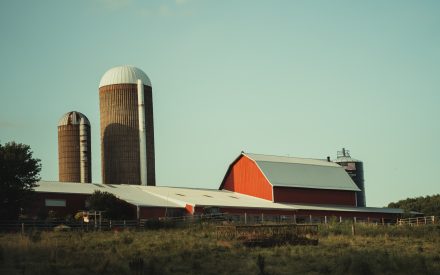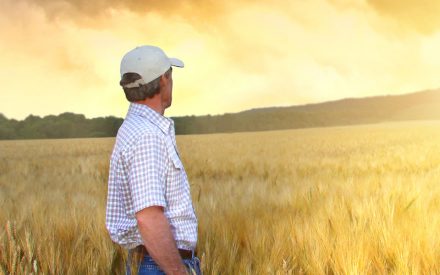
Stress is common in farming. The long hours can sometimes lead to fatigue, especially if there is not enough help. A feeling of a lack of control during changing times and conditions can compound the feeling of uncertainty. Other things that can cause stress are issues related to your kids, relationships, markets, the weather, and other things you are not able to control.
Stress can negatively affect our health, our sleep, our relationships, and our communication with others. When we are stressed or distracted, it also increases the risk of a farm injury or making some type of other mistake. Sometimes, we are experiencing things that are causing stress and may not even realize it though others might see that we seem unhappy, grouchy, tired, or just “different” than we once were.
Take stock
Because of these effects, it is important to recognize and work to positively address, not avoid the causes of stress. In fact, avoidance usually makes matters worse. If you look to the internet for help, it can be overwhelming. Where do you start? Experts recommend farmers take stock of their farm business in order to make informed decisions about the future.
To “take stock” (of something) is to think carefully and clearly understand a situation, so that you can decide what to do. Farmers who lament doing this may feel the outcome will be negative; however, it is a first step to addressing stress caused by uncertainty and puts you on a path to take control of decisions. It may also reveal options you may not have considered.
To take stock of your current operation, utilize important resources such as a calculation of your cost of production, and your farm balance sheet. You can contact your Extension office for help with calculating the cost of production and creating your balance sheet. If you have a loan, you can also access your balance sheet from your lender.
- An accurate calculation of your cost of production may reveal expenses that may be high relative to your peers. A plan to address such issues should be presented to your lender.
- From your balance sheet, it is possible to determine your debt relative to your assets. Depending on your debt-to-asset ratio, you may determine that an operating loan is feasible or perhaps undesirable, based on your cost of production calculation and price projections.
- Re-evaluating your current enterprise may reveal opportunities to enhance cash flow, or alternatives to maintain the farm assets that are most important to you and your family. This may mean selling or renting some assets, and keeping the farm in the family.
You don’t have to go it alone
A change, including a change in daily routine, to a major life event can be unsettling for both adults and children. It is important to talk through the situation with family members, as soon as possible–even though it may be hard to do.
Start the conversation by talking with your family and friends about stress and the changes that might need to happen at home. Resilient families view crisis as a shared challenge, instead of having each person be a “tough, rugged individual” getting through hard times. They believe that by joining together with family members and others who are important to the family they can strengthen their ability to meet challenges. (Walsh, F. 2006 Strengthening Family Resilience. New York: The Guilford Press).
Family members and neighbors often may not know what they can do when someone they care about is under stress. It is important to know that rarely does a response resolve the situation; however, the recognition and connection made is valuable. Simply saying, “I don’t even know what to say, I’m just glad you told me how you feel,” can help reduce stress. For more information on family communication to work together on managing stressful times and family finances, visit: https://fyi.extension.wisc.edu/toughtimes/talking-with-family-managing-stress/
Take care
When stress becomes overwhelming, it is important to recognize the harmful effects and take personal action. Sometimes people cannot recognize signs of stress in themselves, and others might sense something is wrong but may not know how to bring it up. For help in recognizing signs and symptoms of chronic or severe stress visit: www.agsafety.info
Because of these effects, it is important to work to positively manage the effects of stress. Here are some of the most common things that are recommended:
- Eat well, and make you drink enough water (and other fluids) to stay hydrated. Your body and brain need energy – cut back on sugar, caffeine, high-fat food, and make sure you’re eating enough protein (lean meat, beans, eggs, fish, etc.).
- Get enough sleep – Try and stick to a routine where you go to bed and get up at about the same time. Avoid caffeine (coffee, soda, etc.) many hours before bedtime. And, try not to spend time on your smartphone at least a couple hours before sleeping.
- If you are healthy – try to get a little extra exercise. Dairy farming is hard work, but we may not get the type of activity that strengthens our heart, lungs, and brain.
- Take a deep breath, and make it a habit. Practice deep breathing on your walk to the barn or the tractor when you leave the house each day.
Seek (and share) helpful resources
Resources exist to help during times of a change in income or financial need. Health insurance information and options, county-specific resources for agencies and services, local resources for food, housing, child and cash assisting, and more are available, visit www.coveringwi.org/
If any person on your farm expresses the signs and symptoms of extreme stress and talks about harming themselves or ending their life, it is important to provide help and support. The most important resource for support ANYWHERE in the U.S. is the National Suicide Prevention Lifeline accessible for English speaking people at: 1-800-273-8255 or in Spanish at: 1-888-628-9454. See https://suicidepreventionlifeline.org for more information.
Author:
John Shutske, Ag Safety Specialist UW-Extension, Biological Systems Engineering & UW Center for Agriculture Safety & Health
Contributions from:
Steve Okonek, UW-Extension Agriculture Agent, Trempealeau County
Peggy Olive, UW-Extension Financial Capability Specialist and Consumer Science Outreach Specialists UW-Center for Financial Security
Jenny Vanderlin, Associate Director, UW Center for Dairy Profitability & Trisha Wagner, UW-Extension Farm Management Program Manager.



 Extension Educators Supporting You(th)
Extension Educators Supporting You(th) Working together to address farmer well-being and mental health
Working together to address farmer well-being and mental health Farm Stress & Decision-Making During Challenging Times
Farm Stress & Decision-Making During Challenging Times Throttle Back on Stress
Throttle Back on Stress


